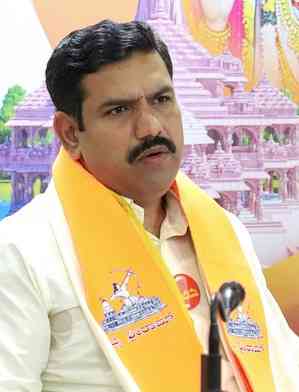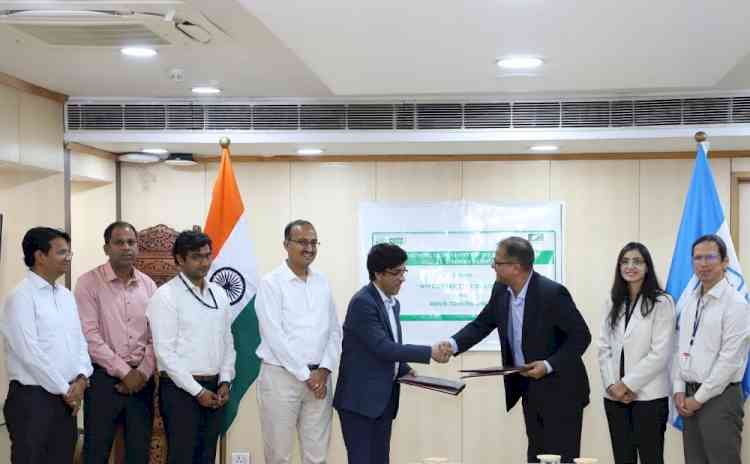CME on ‘Deceased Organ Donation’ held in Ludhiana

Ludhiana, January 20, 2019: Departments of Urology, Nephrology and Transplant, DMCH, Ludhiana, in association with Regional Organ & Tissue Transplant Organization (ROTTO) of PGIMER, Chandigarh organized first-ever CME on ‘Deceased Organ Donation’ today in LT 1 of Dumra Auditoritum. The purpose of organizing the CME was to update the knowledge and expertise of participating delegates in organ transplantation techniques.
The CME was formally inaugurated by Secretary of DMCH Managing Society, Sh Prem Kumar Gupta, who lauded the efforts of organizing members on conducting the conference and said that DMCH, as an institution, has undertaken many activities to promote organ donation from brain-dead people or those who are actually dead.
Principal Dr Sandeep Puri said that organ donation has been one of the greatest advances of medical science that has helped many people in getting a new lease of life but due to lack of awareness and misconceptions, many people due to shortage of organ donors.
Organizing Chairperson-Dr Sandeep Sharma (Professor & Head of Urology) extended warm welcome to all the participating delegates and distinguished guest speakers from PGIMER, Chandigarh and other reputed medical institutions of the country. In his message, Dr Sandeep Sharma said that during the conference, the delegates will be updated about latest advancements in Organ Donation techniques and other related procedures associated with it.
Organizing Secretaries-Dr Vikas Makkar (Professor & Head of Nephrology) and Dr Ravi Angral (Sr. Renal Transplant Surgeon) proposed a vote of thanks to all the faculty and delegates for making this CME a grand success and an informed academic fiesta.
The scientific sessions began with a lecture by Professor Mukut Minz, Former Professor & Head of Renal Transplant Surgery, PGIMER, Chandigarh who informed the audience about how the surgical procedure of ‘transplant’ first began in Boston, USA in the year 1954 and the first successful live renal transplant in India was done at Christian Medical College, Vellore in 1971. The solution to bridge the ever widening gap between organ availability and organ requirement in India is possible only through systematic strengthening of the deceased organ donation programme,said Professor Minz.
In his lecture, Prof Ashish Sharma (Professor & Head of Renal Transplant Surgery, PGIMER,Chandigarh) said, ‘In our country with 400 deaths a day or one life snuffed out every 3.6 minutes in road accidents, deceased donor transplantation offers a second chance of life for many, added Prof .Sharma.
Speaking as the Guest Speaker, Prof. (Dr.) A.K. Gupta, Medical Superintendent cum Head, Deptt.of Hospital Administration, PGIMER Chandigarh highlighted, “In our country where over 5 lakh people are waiting for organ transplant, awareness about the cause can play a savior for those suffering from organ failure and living in constant pain.”
Reflecting on the key initiatives undertaken, Dr Raja Ramchandran and Prof Rajesh Chhabra from Department of Neurosurgery, PGIMER,Chandigarh said that, the state really needs to improve the rate of eye donation. The Government has taken some positive steps However, synergised efforts and engagement of the civil society, religious leaders and other stakeholders are required for creating mass awareness about the cause.
Other speakers, during CME included Dr Rajinder Kaur, Prof Kajal Jain, Dr Puneet Singla, Dr Hardev Ramandeep Singh Girn, Dr P L Gautam and Dr Sahil Goel.
The CME got concluded with Dr Sandeep Sharma expressing his gratitude to ROTTO PGIMER for supporting their endeavor and assured of DMC Ludhaina’s commitment to take forward the national mandate by launching an awareness campaign in DMCH Ludhaina as a precursor.
Prof. Gupta gifted a painting to chief guest-Sh Prem Kumar Gupta made by school students on the theme of Organ Donation under ROTTO PGIMER’s Student Engagement Project, as a token to reiterate the fact that ‘circle of life’ should not break.

 cityairnews
cityairnews 















